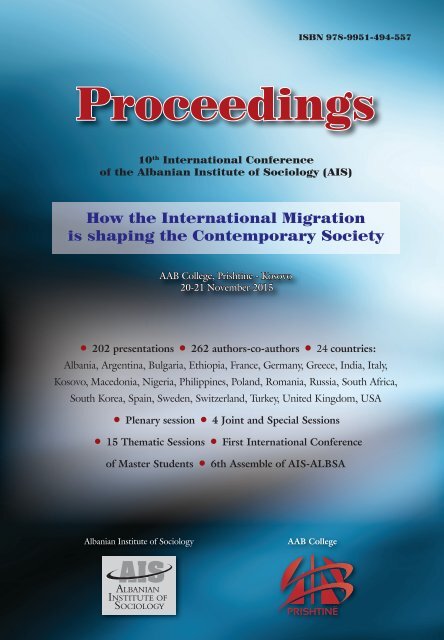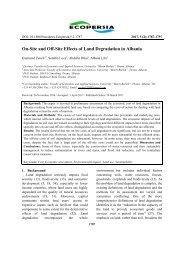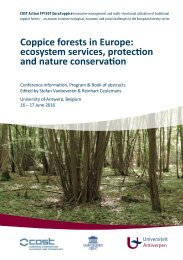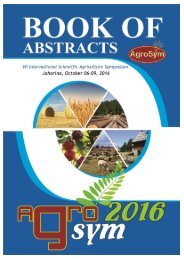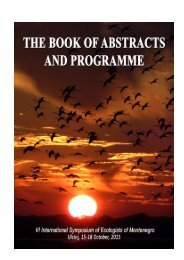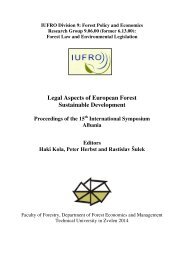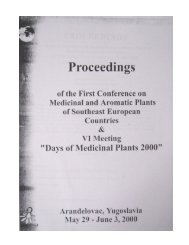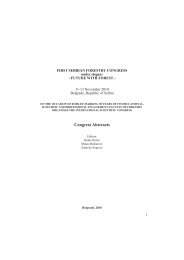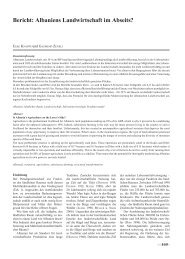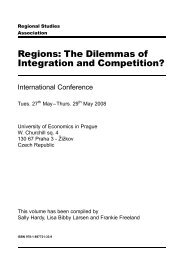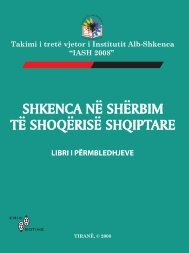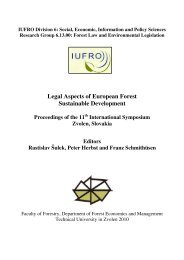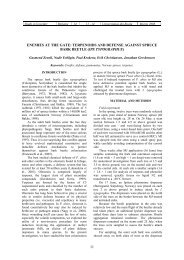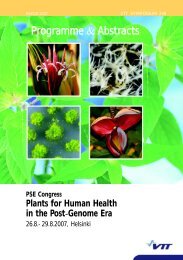Conference Pristina-2015
You also want an ePaper? Increase the reach of your titles
YUMPU automatically turns print PDFs into web optimized ePapers that Google loves.
ISBN 978-9951-494-557<br />
Proceedings<br />
10 th International <strong>Conference</strong><br />
of the Albanian Institute of Sociology (AIS)<br />
How the International Migration<br />
is shaping the Contemporary Society<br />
AAB College, Prishtine - Kosovo<br />
20-21 November <strong>2015</strong><br />
• 202 presentations • 262 authors-co-authors •<br />
24 countries:<br />
Albania, Argentina, Bulgaria, Ethiopia, France, Germany, Greece, India, Italy,<br />
Kosovo, Macedonia, Nigeria, Philippines, Poland, Romania, Russia, South Africa,<br />
South Korea, Spain, Sweden, Switzerland, Turkey, United Kingdom, USA<br />
• Plenary session • 4 Joint and Special Sessions<br />
• 15 Thematic Sessions • First International <strong>Conference</strong><br />
of Master Students • 6th Assemble of AIS-ALBSA<br />
Albanian Institute of Sociology<br />
AAB College
TS 09: Organizations, professions and Work<br />
107 <br />
dissatisfaction, are some various administrative procedures and salaries. Correlations show<br />
that the higher the job satisfaction the higher will be the tendency of workers to stay in the<br />
current organization and vice versa.<br />
Keywords: Turnover, job satisfaction, work, organization<br />
N°AIS AAB Pristine <strong>2015</strong>-13909<br />
Principal Leadership Behaviors Which Teachers at Different Career<br />
Stages Perceive as Affecting Job Satisfaction<br />
Inida BARJAMI<br />
Albanian University, Tirana Albania<br />
E-mail: inida.barjami@yahoo.com;<br />
The purpose of this qualitative study was to explore the perceptions of teachers as to<br />
how the leadership of their principal affects their job satisfaction. This study collected the<br />
view of teachers at different career stages and examined their perceptions and needs. The<br />
participants consisted of 3elementary school teachers at Vlora city Albania at three different<br />
career stages (beginning, middle, and late). This study confirmed that principal leadership<br />
effort can affect job satisfaction, and that principals need to be aware of the needs of their<br />
teachers. It also confirms that knowledge of teacher career stages can help principals create<br />
better working partnerships and determine the professional development needs of their<br />
staff. The findings of this study contribute to the literature on teacher job satisfaction and<br />
principal leadership by providing a better understanding of how teacher job satisfaction<br />
can be impacted by the perceptions that teachers have of principal leadership.<br />
Keywords: Job satisfaction, leadership, career stages<br />
N°AIS AAB Pristine <strong>2015</strong>-14809<br />
Factors determining motivation at work:<br />
UMB Executive Master Students‘viewpoint<br />
Gazmend ZENELI<br />
University Marin Barleti of Tirana, Albania<br />
gzeneli2000@gmail.com;<br />
Asije KOPRENCKA<br />
University Marin Barleti of Tirana, Albania<br />
Email: student.enrollment@umb.edu.al;<br />
Albana LILA<br />
Raiffeisen Bank, Albania<br />
Email: albana.lila@raiffeisen.al;<br />
Human resource management (HRM) plays a crucial role in the process of<br />
increasing companies’ effectiveness, while motivation factors are amongst the most
108 <br />
Abstracts Book<br />
important factors in HRM at all levels of organization. This paper aims to reveal<br />
the motivation factors for Executive Master Program’s students, seen in the light of<br />
existing theories on motivation. The research was based on a survey carried out with<br />
students from UMB who were asked to rank thirteen motivation factors in the order<br />
of their importance. Results indicated that Job security and Good wages were the most<br />
important factors for all students.<br />
Interesting work, promotion in the organization and appreciation of work carried<br />
out were ranked in the top five important factors. These findings suggest that most<br />
efficient motivation system is the one which fulfils a diversity of needs from more than<br />
one category. The approach should not be based solely on intrinsic motivators neither<br />
on extrinsic motivators. The perfect job should be a secure job, well paid, interesting<br />
and offers also a great chance for promotion. Although, it might be hard to offer<br />
a position that satisfies all those needs, organizations should be aware of them. By<br />
following this approach, companies can meet the challenge of attracting, motivating<br />
and retaining the best employees.<br />
Keywords: Employee, Environment, Motivation Theory, Promotion, Rewards, Skills<br />
N°AIS AAB Pristine <strong>2015</strong>-15109<br />
Instruments’ evaluation for measuring<br />
the quality of services<br />
and quality of life in residential programs<br />
Entela AVDULAJ<br />
University Ismail Qemali of Vlore, Albania<br />
E-mail: entavd@yahoo.com; entela.avdulaj@univlora.edu.al;<br />
The paper is part of a doctoral thesis on the Systemic analysis of programs in<br />
residential centers in Albania (23 public centers). The programs are designed and<br />
implemented to improve the lives of users, focusing on physical health, well being<br />
and emotional / mental, social development, education and vocational training,<br />
practical independence and employment and material welfare. The paper is focused<br />
in the evaluation of some basic instruments for measuring the quality of services<br />
and quality of life in these centers, taking in consideration two basic instruments<br />
used for these purposes: 1) The quality systems instrument (Wagner and al, 1999)<br />
used for the measurement of quality of services (output system) and 2) GENCAT<br />
Scale (Verdugo and al, 2009), used for measurement of the quality of life (outcome<br />
system). These instruments are validated and used by the primary health institutions<br />
and social care institutions in Europe. The instruments are evaluated about their<br />
reliability, administration, based in a literature research of several papers published in<br />
the online journals: Evaluation and Program Planning, American Journal of Evaluation,<br />
Educational Research and Evaluation, Disability and Society, European Journal of<br />
Social Work. As a part of the largest thesis methodology, the instruments’ evaluation<br />
is an important step for the quality and reliability of the research.<br />
Keywords: Evaluation, measuring instrument, quality of services, quality of life, residential center
TS 12: Ethnic Relations, Human Rights & Collective Goods<br />
123 <br />
various types of work and that in reality constitutes a high risk for their age and health.<br />
Child labour is considered as a violation of their rights and a violation of human rights<br />
in general, and is the main cause of their exclusion from school engagement. The roads<br />
have now become the main place for socialization of many children due to lack of proper<br />
care and oversight. This phenomenon is widespread in all countries of the world, but a<br />
precise estimate on the number of these children is impossible. The paper aims to identify<br />
and analyze the causes of the involvement of these children at work and gives a special<br />
contribution to the description of this phenomenon in those areas of Kosovo where it<br />
is widespread. The paper is based on quantitative data issued from a survey conducted<br />
through questionnaires and where the subject of research was precisely those children<br />
who belong to different age groups and genders. At the end of the study, we conclude<br />
that poverty is the main reason to encourage children to work because their income is<br />
insufficient for survival.<br />
Keywords: Child labor, poverty, serious affairs, risk of health.<br />
N°AIS AAB Pristine <strong>2015</strong>-14712<br />
Connecting Traditional knowledge and<br />
Genetic resources: reflection of Nagoya Protocol<br />
in the National Biodiversity Strategy<br />
Gazmend ZENELI<br />
University Marin Barleti of Tirana, Albania<br />
E-mail: gzeneli2000@gmail.com;<br />
The Nagoya Protocol (ABS Protocol) aims to share the benefits arising from the<br />
utilization of genetic resources in a fair and equitable way. Based on ABS protocol,<br />
each Party shall take measures, as appropriate, with the aim of ensuring that traditional<br />
knowledge associated with genetic resources that is held by local communities is accessed<br />
with the prior and informed consent or approval and involvement of these indigenous and<br />
local communities, and that mutually agreed terms have been established. By promoting<br />
the use of genetic resources and associated traditional knowledge, and by strengthening<br />
the opportunities for fair and equitable sharing of benefits from their use, the Protocol<br />
will create incentives to conserve biological diversity, sustainably use its components,<br />
and further enhance the contribution of biological diversity to sustainable development<br />
and human well-being. As signatory party of the ABS protocol, Albania is bound by<br />
the relevant ABS provisions of the CBD, which provides the general framework for the<br />
implementation of the Nagoya Protocol.<br />
Considering the interrelationship between genetic resources and traditional knowledge,<br />
their inseparable nature for indigenous and local communities, the importance of the<br />
traditional knowledge for the conservation of biological diversity and the sustainable use<br />
of its components, and for the sustainable livelihoods of these communities, this paper<br />
sheds light on the connections between traditional knowledge and genetic resources as one<br />
of the major objectives of the newly formulated National Biodiversity Strategy of Albania.<br />
Keywords: Access, Biodiversity, Convention, Genetic resources, Traditional Knowledge.


